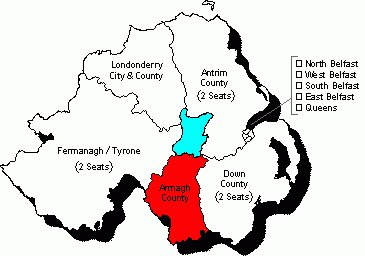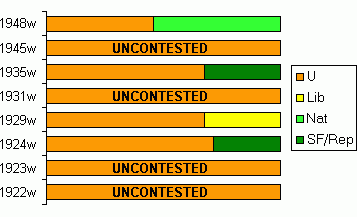

 |

|
| |
| |

|

|
| Map and diagram by Conal Kelly | |
This constituency incorporated all of county Armagh. Established under the terms of the Government of Ireland Act 1920, the constituency replaced the Westminster seats of North Armagh, Mid Armagh, and South Armagh. Between 1922 and 1949 the constituency was represented by the same Unionist MP, Lt-Col. Sir William Allen. The general elections of 1922, 1923, 1931, and 1945 went uncontested. The declared winner in each case was the sole Unionist nominee.
See also election results for Armagh 1950-1970 and 1973-1982.
| U | Lib | Nat | SF/Rep | |
| 1948w-b | 60.1% | 39.9% | ||
| 1945w | * | |||
| 1935w | 67.6% | 32.4% | ||
| 1931w | * | |||
| 1929w | 67.4% | 32.6% | ||
| 1924w | 71.2% | 28.8% | ||
| 1923w | * | |||
| 1922w | * |
* The only candidate nominated for the 1922, 1923, 1931 and 1945 General Elections was Unionist Lt-Col. Sir William Allen. In each instance the sole candidate was therefore duly elected without a contest.
Unionist majority: 12,314; electorate: 70,337; votes cast: 86.9%
Following the death of
Allen in December 1947, a by-election was held the following March. The Unionist
Party selected Maj. Richard Harden to defend the seat they had held since 1922.
Opposition would come in the form of James O'Reilly, the Nationalist Party
candidate. O'Reilly performed well, capturing just under 40% of the vote.
However, on a massive turn-out of 86.9%, Harden was comfortably first past
the post with a majority of over 12,000.
Harden would continue to represent Armagh until his resignation in November
1954. O'Reilly was elected in the 1958 Northern Ireland general election for
Mourne and held the seat until 1972. He stood unsuccessfully in South Down
for the 1973 Northern Ireland Assembly election.
Unopposed Unionist Candidate.
As was the case in 1922, 1923 and 1931, the Unionist Party faced no opposition in Armagh in the 1945 Westminster elections. Allen was returned to Westminster unopposed once more.
Unionist majority: 17,718; electorate: 68,582; votes cast: 73.3%
Defending his seat in 1935,
Allen would face a new opponent in the form of Republican candidate Charles
McGleenan. While McGleenan managed to attract over 32% of the vote, the result
was still a comfortable victory for Allen, who increased his majority by almost
4,000 votes compared to the last contest in 1929.
McGleenan would go on to be elected to the Northern Ireland House of Commons in a
South Armagh by-election in 1950. He successfully held the seat in the 1958 general
election. He would also unsuccessfully contest Armagh again in the
1966 Westminster elections.
Unopposed Unionist Candidate.
Allen was once again the Unionist Party candidate in 1931. However, this time he did not face an opponent and so was duly elected without a contest. Armagh was one of nine seats that went uncontested in the 1931 general election in Northern Ireland. The sole nominee (and hence winner) in each instance was the Unionist candidate.
Unionist majority: 13,914; electorate: 66,527; votes cast: 60.2%
Once again the Unionist
Party nominated Allen to defend the Armagh seat. The opposition this time
around would come from the Liberal Party who had nominated William Todd as
their candidate. This was one of four constituencies being contested by the
Liberals in 1929. In the end, Todd managed to capture just a third of
votes and Allen was returned with a slightly reduced majority of just under
14,000.
Unionist majority: 17,265; electorate: 54,376; votes cast: 75.0%
In this, the third election in as many years, Allen would face a new opponent in the form of Sinn Fein candidate James McKee. With a turn-out of 75%, Allen won comfortably, securing just over 71% of the vote and a majority in excess of 17,000. While McKee was some way behind, he was the highest polling Sinn fein candidate of the election.
Unopposed Unionist Candidate.
As was the case in 1922, Allen was the sole candidate nominated in Armagh and was duly elected without a contest once more. Armagh was one of nine seats that went uncontested in the 1923 general election in Northern Ireland. The sole nominee (and hence winner) in each instance was the Unionist candidate.
Unopposed Unionist Candidate.
This was the first election for the newly established Armagh constituency. The new constituency replaced the North Armagh, Mid Armagh, and South Armagh constituencies that had been used in the 1918 election. Sir William Allen had been previously elected to represent North Armagh in a 1917 by-election and again at the 1918 general election. As the sole nominee in Armagh in 1922 he was duly elected without a contest.
See also:
Results from 1922 to 1949 for each seat: East Belfast | North Belfast | South Belfast | West Belfast | Antrim | Armagh | Down | Fermanagh and Tyrone | Londonderry | Queens University
Other sites based at ARK: ORB (Online Research Bank) | CAIN (Conflict Archive on the INternet) | Northern Ireland Life and Times Survey
Your comments, please! Send an email to me at nicholas.whyte@gmail.com.
Conal Kelly, 10 October 2007.
|
Disclaimer:©
Nicholas Whyte 1998-2004 Last Updated on Wednesday, 12-Jan-2005 12:12
|